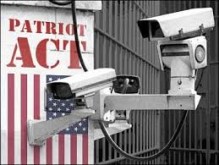From Archipelago, June 2002:
On Opposing the U.S.A. PATRIOT Act
Senator Russell Feingold
Editor’s note: In an address given October 12, 2001, to the Associated Press Managing Editors Conference at the Milwaukee Art Museum, Milwaukee, Wisconsin, Sen. Feingold (D-Wis) explained why he, alone among United States Senators, voted against the Administration-sponsored “U.S.A. Patriot” Act. The text below followed his introductory remarks.
[T]his conference comes at a tragic time for our country. Let us first pause to remember, through one small story, how September 11th has irrevocably changed so many lives. In a letter to The Washington Post last Saturday, a man wrote that as he went jogging near the Pentagon, he came across the makeshift memorial built for those who lost their lives there. He slowed to a walk as he took in the sight before him – the red, white and blue flowers covering the structure, and then, off to the side, a second, smaller memorial with a card.
The card read, “ Happy Birthday Mommy. Although you died and are no longer with me, I feel as if I still have you in my life. I think about you every day.”
After reading the card, the man felt as if he were “drowning in the names of dead mothers, fathers, sons and daughters.” The author of this letter shared a moment in his own life that so many of us have had – the moment where televised pictures of the destruction are made painfully real to us. We read a card, or see the anguished face of a grieving loved one, and we suddenly feel the enormity of what has happened to so many American families, and to all of us as a people.
We all also had our own initial reactions, and my first and most powerful emotion was a solemn resolve to stop these terrorists. And that remains my principal reaction to these events. But I also quickly realized that two cautions were necessary and I raised them on the Senate floor within one day of the attacks.
The first caution was that we must continue to respect our Constitution and protect our civil liberties in the wake of the attacks. As the chairman of the Constitution Subcommittee of the Judiciary Committee, I recognize this is a different world with different technologies, different issues, and different threats. Yet we must examine every item that is proposed in response to these events to be sure we are not rewarding these terrorists and weakening ourselves by giving up the cherished freedoms that they seek to destroy.
The second caution I issued was a warning against the mistreatment of Arab Americans, Muslim Americans, South Asians, or others in this country. Already, one day after the attacks, we were hearing news reports that misguided anger against people of these backgrounds had led to harassment, violence, and even death.
I suppose I was reacting instinctively to the unfolding events in the spirit of the Irish statesman John Philpot Curran, who said: “The condition upon which God hath given liberty to man is eternal vigilance.”
During those first few hours after the attacks, I kept remembering a sentence from a case I had studied in law school. Not surprisingly, I didn’t remember which case it was, who wrote the opinion, or what it was about, but I did remember these words: “While the Constitution protects against invasions of individual rights, it is not a suicide pact.” I took these words as a challenge to my concerns about civil liberties at such a momentous time in our history; that we must be careful to not take civil liberties so literally that we allow ourselves to be destroyed.
But upon reviewing the case itself, Kennedy v. Mendoza-Martinez, I found that Justice Arthur Goldberg had made this statement but then ruled in favor of the civil liberties position in the case, which was about draft evasion. He elaborated:
Return to From the Pages of Archipelago
